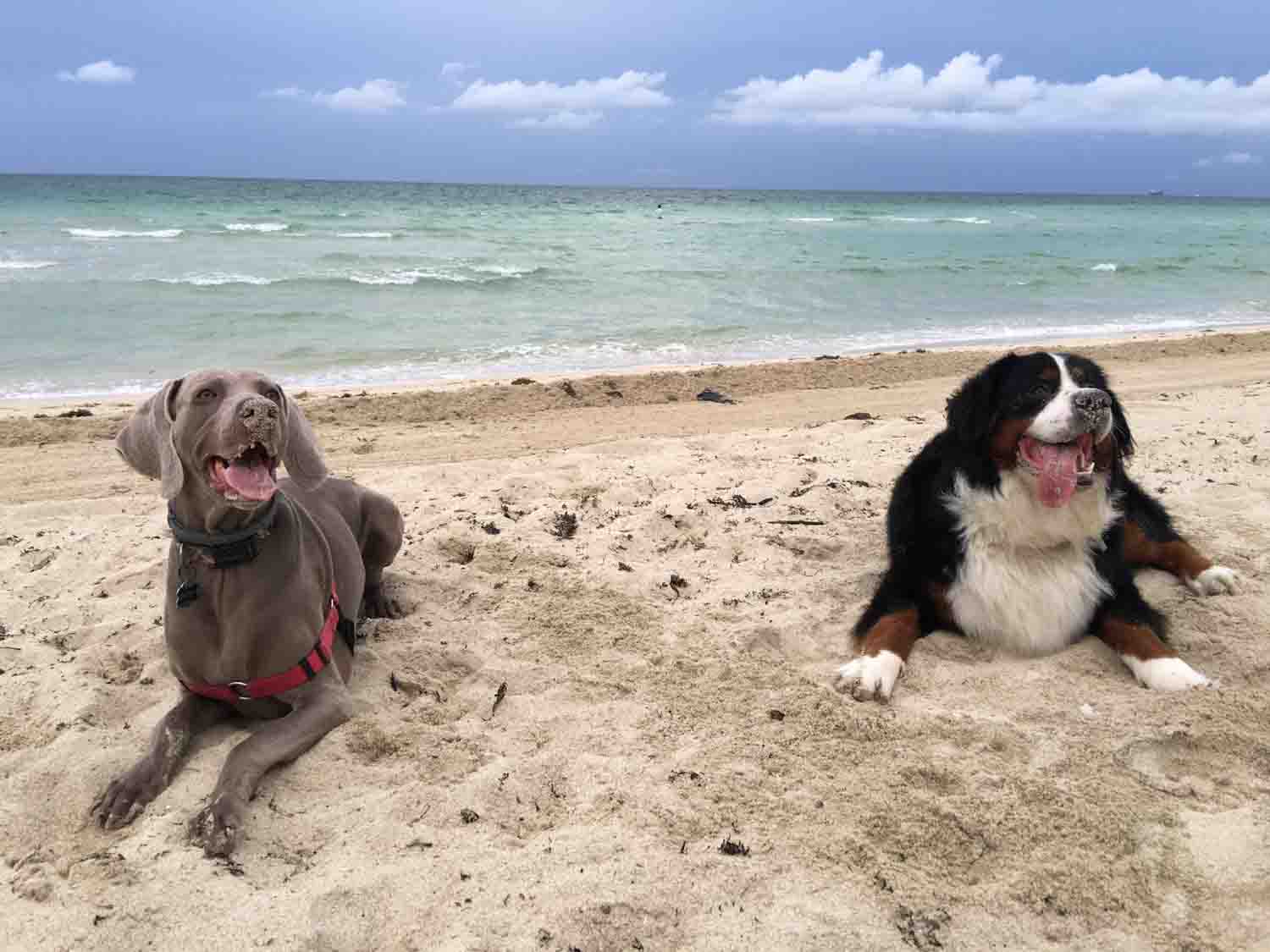Five Questions for Dr. Moore: Summer Heat and Health
How to Protect Your Dog From Summer Heat
On our beach walk this morning, Bodhi played with a dog half his age. It’s July, so it was hot and humid and he really got worn out! The warmer months can certainly be more fun for you and your dog, but you really need to take care to ensure your pooch stays healthy during the … dare I say it? … the DOG DAYS OF SUMMER! Here’s our interview with Dr. Christina Moore about summer heat and health.

Summer Heat
Urban Dog: When we exchanged emails in preparation for this interview, it quickly became apparent to me that summer heat and dehydration are a big problem for dogs. I think most dog owners know, or can at least intuit, that dogs don’t sweat like we do and that they pant to keep cool. What are the things dog owners should be aware of with summer heat?
Dr. Moore: Dogs don’t sweat like we do, their paw pads sweat a little, but panting is the main way dogs expel heat. Bodhi is probably better at cooling himself down than many other breeds. He has that nice long snout and he’s able to pant more effectively than many of the brachiocephalic, or short-nosed, dogs like French Bull Dogs. They’re the number one dogs in New York City for developing heat stroke because they can’t cool themselves and the insides of their mouths and airways tend to swell up, which just makes it harder for them to keep themselves cool.
One of the things you need to be aware of is that dogs don’t really know when to rest, they’ll go and go. In warmer weather you want to take your dog out to play, but you need to watch your dogs and make them take breaks. Pay attention to how much they are panting. If your dog is really panting a lot and can’t get their breath back to normal, it’s important to get them to a shady spot, let them rest, and drink some water. It’s absolutely important you carry water with you at all times.
Summer Fun
Urban Dog: There are of course other health concerns that summer heat and summer fun bring, we’re going to rapid fire them here. When it’s nice out, we like to take our dogs to the beach, to cookouts, to the pool. What are the concerns there? What about sunburn and burnt paw pads?
Dr. Moore: If you have a white dog or a dog with pink skin, or a pink nose, it may be necessary to use sunscreen for those areas, because they can burn that skin. Usually if the area is covered in fur, that area should be fine, even if it’s white fur. If your dog tends to roll over on to his back and sunbathe with his belly to sky, then of course that could get burned as well.
Regarding the paw pads, they’re definitely something to pay attention to, especially if you’re out at noon with the sun beating straight down on the sidewalk. They can definitely get burned. Paw pads are usually dark and can withstand short walks in the mid-afternoon sun. Just be careful walking on the concrete at the hottest time of day. The paw pads are thicker than our palms and the soles of our feet, but they’re still sensitive!
Urban Dog: Salt water, pool water, sand?
Dr. Moore: My rule of thumb is that if it’s not good for us to eat or drink it, it’s not good for dogs to eat or drink it. If you ingest a little bit of salt water or pool water when you’re swimming that’s okay. But you don’t want your dog lapping up salt water or pool water, which just underscores how important it is to have water with you when you’re outside with your dog during the summer.
Regarding sand, I remember that you had some problems with Bodhi after he ingested a lot of sand when you were at the beach one day. You told me he’d been digging lots of holes and had been chasing tennis balls all afternoon. So every time he picked up a ball he got a lot of sand in his mouth. The next day he kept throwing up his food because it wouldn’t pass through his stomach. Eventually he passed a lot of sand in his stool.
Some dogs actually eat sand because it’s salty and it tastes good. We’ve seen where dogs have eaten so much sand that heir intestine get impacted with sand; theress so much sand it just absorbs all the moisture. That means there’s no moisture to lubricate things. At that point we have to resort to surgery. Luckily Bodhi passed the sand on his own. If you think your dog is ingesting too much sand, limit the amount of time he spends at the beach.
Urban Dog: Cookouts and fireworks?
Dr. Moore: Be careful at BBQs. We see so many dogs come in because they’re eaten so much human food that upsets their stomachs. Don’t feed dogs people food at cookouts!
With fireworks, there are new products that actually go in the ear that can help a dog a lot. If your dog reacts really badly to the noise of fireworks you should ask your vet about these new products. One such product is Sileo which you can learn more about here.

Parasites
Urban Dog: We’ve talked about parasites before. Summer is a time you really need to watch out for vector-borne diseases, no?
Dr. Moore: Mosquitoes are a huge problem this time of year, especially if you live near the water or live in the South. Mosquitos transmit heart worm. It’s absolutely crucial you give your dog heart worm prevention medicine every single month of their whole life. You just have to do it. It’s a preventable disease. It’s a terrible disease to treat if you get to that point. And it’s a disease that can kill your dog.
Make sure you use flea and tick preventatives. We’re seeing a lot of lyme disease in dogs. There are products that will repel ticks and fleas. Vectra 3D repels fleas and ticks, they don’t even latch on to your pet. With some of the other topical products, the fleas and ticks and have to latch on, and then they die. There’s a chance a disease can be transmitted before they die. There are also collars like the Seresto Collar which is supposed to repel fleas and ticks. Other options include oral products. Those work for dogs who have reactions to the topical products.
To read more about vector-borne illnesses, check out our previous interview with Dr. Moore. Click here to read Five Questions for Dr. Moore: Fleas and Ticks.
Note: Bodhi has been wearing a Seresto Collar for months. The day after we conducted this interview, I found two live fleas on him. We are going to switch to Vectra 3D on Dr. Moore’s recommendation.
Diseases
Urban Dog: Are there any diseases that occur more frequently in the summer? I read somewhere recently that a disease called leptospirosis is more common in warmer weather. Also, during the summer lots of businesses leave water bowls out for dogs, should we be concerned about disease spreading from dog-to-dog via communal water bowls?
Dr. Moore: Leptospirosis is a bacterial infection that affects the kidneys. It’s transmitted via the urine of wild animals, so in urban areas that usually mean rats. I am not sure why it might be more common in the summer except to say that maybe these animals come out in the open more, so your dog may be more likely to be exposed. There’s a great vaccine for it and most dogs are vaccinated for it when they are puppies. I highly recommend getting your dog vaccinated against it.
Regarding transmission of disease via water bowls, I wouldn’t be over concerned about that. I don’t prevent my dogs from draining out of those bowls and it’s likely that the establishments in question are changing the water all day long. I don’t think the dogs drinking out of those bowls are any more or less likely to transmit disease than the dogs you’d meet in a dog park. I think it’s more important for your dog to be hydrated, so those bowls are a good source of water.
Allergies
Urban Dog: Our last summer heat question: are there season allergies for dogs like there are for humans?
Dr. Moore: We don’t really see dogs get seasonal allergies the way we do, it’s more like their existing allergies get worse in the summer heat. Some of that might be that there’s an environmental component to their allergic reactions or it might be that their skin is more sensitive in the summer. Dogs don’t typically sneeze when they are allergic the way we do, they end up being itchy when they’re having an allergic reaction. You usually see the allergic respond on bare skin. So keep your eye out for your dog chewing around their tail, or their feet, or scratching around their neck, first we check for fleas and other parasites, we start looking at allergies. The big problem is that they can get infections. So make sure you see your vet if you think your dog is having an allergic reaction.
One final note, we asked Dr. Moore about summer cuts for dogs. I noticed recently an Eskimo Dog in our building got a haircut to help her deal with the summer heat. Dr. Moore’s advice is to find a good groomer. Not all dogs need summer cuts and not all haircuts are effective as a summer cut. It all depends on the dog or breed and the type of coat they have. A knowledgeable groomer will be able to assess your dog’s needs appropriately.






